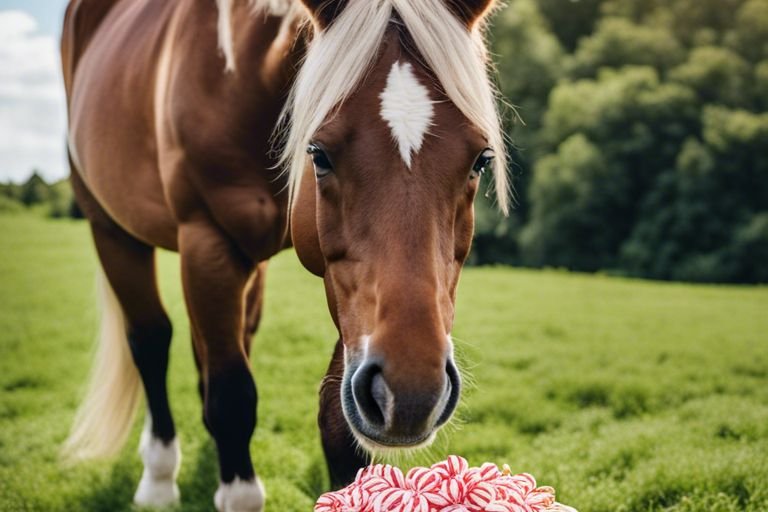It’s a common sight at riding stables and horse shows: riders offering peppermints to their equine companions as a tasty treat. But can horses really enjoy these sweet treats safely? While peppermints may seem harmless, it’s important for horse owners to understand the potential risks and benefits of feeding these candies to their four-legged friends. In this post, we’ll probe into the world of peppermints and ponies, exploring the impact of these sugary delights on horse health and behavior.
Understanding Horse Dietary Needs
Nutritional Requirements of Horses
To understand if horses can enjoy peppermints and other sweet treats safely, it’s crucial to first grasp the dietary needs of these animals. Horses are herbivores with a digestive system designed for grazing on high-fiber foods like grass and hay. They require a balanced diet that includes a mix of grass, hay, grains, and supplements to meet their nutritional needs.
Risks and Benefits of Sugary Snacks
On the topic of offering sugary snacks like peppermints to horses, it is important to weigh the risks and benefits. While horses may enjoy the taste of sweet treats, indulging them too frequently can lead to health issues such as weight gain, dental problems, and digestive upset. It’s important to consider the potential risks before incorporating these snacks into a horse’s diet.
The decision to offer sugary snacks to horses should be made with careful consideration of their overall diet and health. While occasional treats like peppermints can be enjoyed by some horses in moderation, it’s crucial to balance their diet with nutritious foods that meet their specific dietary requirements. By understanding the risks and benefits of sugary snacks, horse owners can make informed choices that prioritize their horse’s well-being.
Peppermints and Ponies: A Detailed Look
If you’ve ever wondered whether it’s safe to give your horse peppermints as a treat, you’re not alone. With their sweet taste and refreshing scent, peppermints can be a tempting choice for horse owners looking to spoil their equine companions. However, before reaching into that candy jar, it’s important to understand the potential risks and benefits associated with feeding peppermints to horses. For more information on safe treat options, check out Trick or Treat – Which Halloween Candy Is Safe For Horses?.
Composition of Peppermints: Potential Dangers and Benefits
On the surface, peppermints may seem harmless, but their composition can pose risks for horses. While the sugar content in peppermints can provide a sweet indulgence that many horses enjoy, excessive consumption can lead to issues like weight gain, insulin resistance, and dental problems. Additionally, some peppermints may contain ingredients like artificial colors or flavors that could be potentially harmful to equines.
How Horses Process Sugars
The way horses process sugars differs from humans, making them more susceptible to certain health issues when consuming sugary treats like peppermints. Horses’ digestive systems are designed to break down fibrous plant materials, not large amounts of sugars or carbohydrates. When horses consume sugar-rich treats, their bodies may struggle to metabolize these substances efficiently, potentially leading to digestive upsets or metabolic imbalances.
Detailed information about how horses process sugars can help horse owners make informed decisions about including peppermints in their equine companions’ diets. It’s crucial to consider the individual horse’s health status, dietary needs, and any underlying conditions before offering peppermints or other sugary treats. While an occasional mint as a special reward may be acceptable for some horses, moderation is key to ensuring their overall well-being.
Feeding Practices and Precautions
Safe Treat Feeding Guidelines
Keep in mind that treats should only make up a small portion of a horse’s diet, typically less than 10% of their daily intake. When offering peppermints or other sweet treats, be sure to break them into small pieces to prevent the horse from choking. It’s also important to choose treats that are safe for equine consumption, avoiding any toxic ingredients such as xylitol.
Identifying Signs of Overfeeding and Dietary Distress
On occasion, horses may show signs of overfeeding or dietary distress after consuming treats like peppermints. These signs can include digestive upset, such as colic or diarrhea, as well as behavioral changes like restlessness or lethargy. If you notice any of these symptoms, it’s crucial to consult with a veterinarian to address any potential health concerns promptly.
Identifying signs of overfeeding and dietary distress is vital in ensuring the well-being of your horse. Monitoring their behavior and physical condition after offering treats can help you detect any issues early on. Be mindful of, moderation and caution are key when it comes to feeding horses treats like peppermints.
Alternatives and Moderation
Healthier Treat Options for Horses
Moderation is key when it comes to treating your horse. Instead of sugary peppermints or candy, consider offering healthier options such as carrots, apples, or hay cubes. These alternatives are not only safe for your horse but also provide nutritional benefits.
Balancing Treats and Regular Diet
To maintain a healthy and balanced diet for your horse, it is crucial to consider the treats given in addition to their regular feed. Treats should only make up a small portion of their overall daily intake. Be mindful of the sugar content in treats and adjust your horse’s regular meals accordingly to prevent excess weight gain or dietary imbalances.
Healthier treat options like vegetables or low-sugar fruits can be integrated into your horse’s diet as an occasional reward, promoting a positive and balanced approach to treating your equine companion.
Summing up
Considering all points discussed, it is clear that while horses may enjoy the taste of peppermints and ponies as treats, these sugary snacks should be given in moderation. Excessive consumption can lead to health issues such as tooth decay, digestive problems, and weight gain. It is crucial for horse owners to prioritize their animal’s well-being and provide healthy, balanced diets to maintain their overall health and fitness. While the occasional peppermint or pony may be a special treat, it should not become a regular part of their diet to ensure their safety and well-being.
